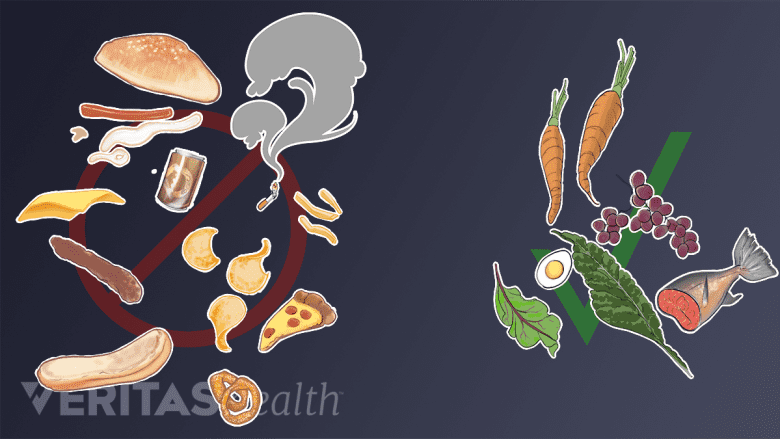Did you know that the foods you eat can affect your arthritis pain and symptoms? Inflammation, a major cause of arthritis, is often made worse (or better) because of a person’s diet.
You can influence inflammation by eating anti-inflammatory foods, such as leafy greens and colorful vegetables, and avoiding these 7 inflammatory foods:
1. Processed foods
Avoid processed foods, such as baked goods and prepackaged meals and snacks. These items contain trans fats to help preserve them, and trans fats trigger systemic inflammation. To dodge trans fats, avoid any foods labeled as containing partially hydrogenated oils.
2. Omega-6 fatty acids
Corn, peanut, sunflower, safflower, and soy oils, as well as most meats, are high in omega-6 fatty acids, which are only healthy in small doses. Excessive omega-6 consumption can trigger inflammatory chemicals.
See The Ins and Outs of an Anti-Inflammatory Diet
3. Sugar and certain sugar alternatives
Foods that contain refined sugar—including pastries, chocolate, candy, soda, and even fruit juices—trigger the release of proteins in the body called cytokines, which cause inflammation. Sugar is labeled many ways in food items; in addition to sugar, watch out for corn syrup, fructose, sucrose, or maltose in ingredient lists.
Cutting back on regular sugar may lead people to seek out foods made with sugar alternatives, such as aspartame and sucralose, when a sweet tooth hits. However, some people are sensitive to these substances, which can cause an inflammatory response from the body. Sugar alternatives are often found in diet sodas, gum, sugar-free candy, and low-fat yogurt and pudding.
4. Red meat and fried foods
Meat—especially red meat—is high in saturated fats, which may cause high cholesterol and inflammation. In addition, meat contains high levels of advanced glycation end products (AGEs) that stimulate inflammation, particularly when it is broiled, grilled, roasted, or fried.
See An Anti-Inflammatory Diet for Arthritis
It’s not just fried chicken that you should avoid, though. Other fried foods, such as donuts and french fries, contain trans fats in addition to AGEs.
5. Refined carbohydrates
White flour products, such as white bread, white pasta, and crackers, are considered refined carbohydrates. Refined carbohydrates, also called refined grains, cause a spike in blood glucose, which has been shown to increase inflammation in the body.
Another factor to consider about grains: People with gluten sensitivities may experience joint pain and inflammation from consuming wheat products.
See How Gluten Can Cause Joint Pain
6. Cheese and high-fat dairy
Cheese, butter, cream cheese, margarine, and mayonnaise are all high in both saturated fats and advanced glycation end products (AGEs)—they’re big inflammation triggers and should be consumed sparingly. However, a recent study found that some dairy products, especially fermented dairy products like Greek yogurt, are anti-inflammatory for people who are not sensitive to cow’s milk.
See Ingredients That May Trigger Fibromyalgia Symptoms
7. Alcohol
Experts agree consuming too much alcohol increases inflammation and health risks. However, the research regarding moderate alcohol consumption is mixed.
If you are trying to decrease inflammation, try cutting out alcohol altogether for 4 to 6 weeks and see what happens. You may notice a decrease in inflammatory joint pain. You may also notice that you sleep better—which itself can help decrease chronic pain symptoms.
Initially, it may seem like many tasty foods are off-limits. Keep in mind that a few simple swaps can often make the difference between healthy and unhealthy food choices. For example, cook with olive oil instead of corn oil, or swap out white bread for whole-grain bread.
Avoiding foods and drinks that trigger inflammation is not just good for your arthritis. An anti-inflammatory diet can also help prevent other chronic conditions like heart disease and diabetes.
Learn more:
Editor’s Top Picks
- The Science Behind Leaky Gut, the Gut Microbiome, and Arthritis
- Turmeric and Curcumin for Arthritis
- Improving the Gut Microbiome and Arthritis Symptoms with Diet
- Video: Turmeric Roasted Cauliflower for Arthritis Pain Relief
- Video: The Best-Tasting Anti-Inflammatory Cocktail You've Never Tried
- Foods to Avoid with Fibromyalgia






